Table of Contents
ToggleConnecting between the uterus and the ovaries, the Fallopian Tubes work as one of the major female reproductive organs looking like a couple of thin tubes. Fallopian Tubes surround the uterus from both sides. This feminine organ helps transport the fertilised, implantable eggs from the ovaries toward the uterus.
But sometimes, these passage tubes are blocked due to some reasons. Damaged or blocked fallopian tubes will hinder your fertility, reducing your chances of a healthy pregnancy.
Aastha Fertility Experts holds their expertise in offering the best fertility treatments like IVF, IUI, ICSI, Cryopreservation, and many others.
Connect with our experts now at +91 9829 069 228 to find the details for success rates for the treatments.
What Are Blocked Fallopian Tubes?
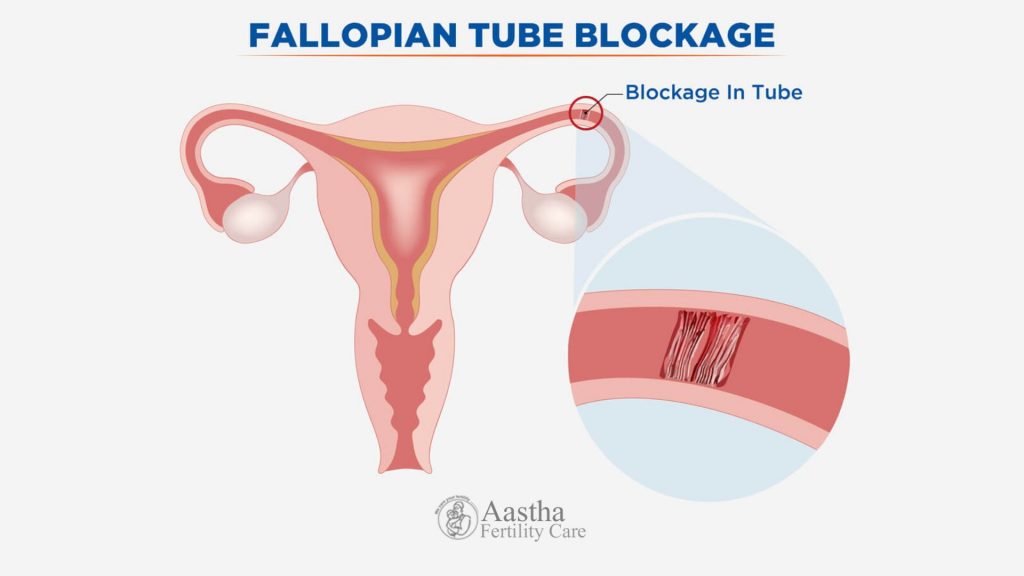
Blocked Fallopian Tubes mean a blockage in your fallopian tubes, impacting your ability to get pregnant. It happens when one or both of your fallopian tubes has a blockage, which prevents sperm and egg from meeting and fertilising, making it hard for you to get pregnant.
More than 30% of the females in this world face this infertility problem and find it hard to get pregnant. There are many cases where women are seen with only one fallopian Tube since birth and are struggling with a healthy pregnancy.
Everything You Need To Know About Blocked Fallopian Tubes
There are mainly three types of Blockages found in the Fallopian Tubes:
- Proximal Tubal Occlusion
This type of fallopian tube blockage involves the isthmus (a part of the fallopian Tube about 2 cm long) connecting the ampulla to the uterus. This problem occurs due to the complications associated with abortion or pelvic inflammatory diseases.
- Obstruction of Midsegment Tubal
The operation, infection, or surgery: any of these reasons can trigger mid-fallopian tube blockages as this area is thin and weak, so it is more susceptible to damage.
- DTO (Distal Tubal Occlusion)
Being adjacent to the ovaries, distal tubal occlusion is usually the result of the obstructed fallopian Tube. It happens after as an effect of a sexually transmitted disease, namely ‘Chlamydia’ or ‘Gonorrhea.’
What Causes A Fallopian Tube To Be Blocked?
There are many reasons for Blocked Fallopian Tubes, the primary one being Scar Tissues and Pelvic Adhesion. Other causes can be:-
- Pelvic Inflammation
Patients who come with blocked fallopian tubes are mostly diagnosed with pelvic inflammation. It occurs inside the tubes because infections such as chlamydia and gonorrhea are transferred during sexual intercourse from the male body to the female body. And this inflammation can also occur outside the tube due to an infection from other organs in the appendix.
- Disease Since Birth
This condition is slightly rare, but it can also happen that this problem has been in you since birth.
- Accidental Damage Following Other Surgery
Any surgery leads to scar tissue, and if the quantity is excessive, it can be a potential reason for blocked fallopian tubes.
- Severe Endometriosis
In the Tube, Endometriosis can build endometrial tissues; it causes excruciating and heavy periods and pelvic pain, which can lead to blockages.
- Growth of Fibroid
It blocks the path between the uterus and the fallopian tubes. It blocks the transfer of the mature egg from the ovary to the uterus, making it hard to get pregnant.
- Ectopic Pregnancy
Typically, a fertilised egg (embryo) travels to the uterus for implantation. Still, in the case of ectopic pregnancy, the egg develops and implants outside the uterus, frequently in the fallopian tubes, causing the fallopian tubes to become blocked.
Infertility Caused by Blocked Or Damaged Fallopian Tubes
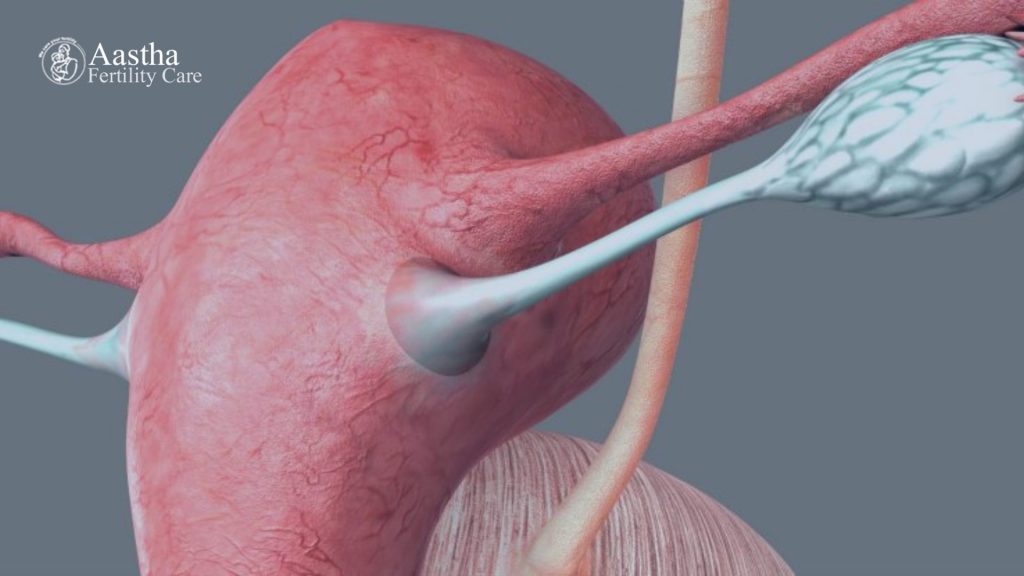
Do you know around 25-31% of tubal factor infertility account for all cases of infertility?
The tubal factor is most commonly the culprit in female infertility.
Despite various attempts, most couples cannot conceive because of the blocked fallopian tubes, which don’t allow the eggs (embryo) to pass freely to the uterus and make conceiving hard.
So getting your fallopian tubes tested for infertility-related issues becomes crucial for those who want to conceive naturally without surgery.
Is Pregnancy Possible With One Fallopian Tube?

Yes, you can bring your offspring to this world with one fallopian Tube.
But you need to ensure that the other fallopian Tube is all in good condition-
- You have no known infertility factors;
- You are healthy,
- You menstruate regularly (every 21 to 35 days or so).
Because health and age play an important role in egg quality when one Tube is not there, there are also cases where many females are born with only one Fallopian Tube. In those cases, the working Tube moves to the other ovary and collects an available egg.
One open and healthy Tube is enough for a successful conception.
5 Steps For Pregnancy With A Single Fallopian Tube

Getting pregnant with one fallopian tube working is possible, but if both tubes are blocked, then it is impossible without treatment.
- Recognise If You Have Open Or Closed Fallopian Tubes
Understanding why fallopian tubes are essential in getting pregnant is crucial.
Knowing whether you have blocked or open fallopian tubes can make getting pregnant much more straightforward.
Blocked fallopian tubes don’t come with any symptoms; women get aware of those only when they try to conceive and are unsuccessful.
Few Symptoms That You May Experience
- Abdominal pain (generally at one side).
- Heavy and painful periods along with pelvic pain.
A damaged or congested fallopian tube blocks the pathway of the egg for meeting the sperm, which ultimately results in unsuccessful pregnancies, so it becomes important to know whether you are suffering from any blocked fallopian tube problem or not.
- Check On Your Periods
A regular menstrual cycle (every 21-35 days) is a must for getting pregnant successfully with only one fallopian Tube.
The fallopian Tube must be clear and healthy, and your age and health will also determine whether you will become pregnant. The egg quality decreases as women age. In the case of unhealthy or immature eggs, the chance of a successful pregnancy is quite slim.
- The Male Partner’s Fertility Also Matters:
The reproductive health of your male partner is just as important as yours. If he has any of the following infertility factors: poor sperm quality, sexual or erectile dysfunction, and anatomical abnormalities, it will be complex for him to become pregnant.
If you know that only one of your fallopian tubes is functioning correctly, testing your male partner for infertility is just as important as testing yourself.
- Choose Your Treatment
These three types of surgeries are often recommended to women trying to get pregnant with one Fallopian Tube.
The selection of treatment options needs to be based on your unique needs, which would eventually give you the best chance of a healthy pregnancy.
The three common surgeries are –
- Laparoscopic Surgery
- Tubal Ligation Reversal Surgery
- In-Vitro Fertilization(IVF).
This is recommended when you are experiencing pelvic pain or to diagnose if you have infertility issues. Often laparoscopy surgery treats some causes of infertility and allows you to get pregnant naturally or without treatment.
A small incision at the belly button is made in laparoscopy, and a telescope is inserted through it. The process begins from then on.
Usually, one should be fit within two to three days of this surgery.
- TLRS (Tubal Ligation Reversal Surgery)
It may be possible to repair a damaged fallopian tube. The blockage or damaged condition will be an essential factor. The tube’s position also plays a deciding role. Through this surgery, the parts of the blocked or cut are made to travel again through it.
But even if you have the surgery, there’s no guarantee of you getting pregnant. Success rates range between 40% to 80%. Success further depends on your age and other health-related factors.
- In-Vitro Fertilization (IVF)
“Assisted reproductive technology (ART)” is probably the most fruitful form of IVF. Sperms and eggs of the couple are used for this treatment.
Any blockage of the fallopian Tube hinders the travel path of the eggs or embryo to the uterus.
Hence, fertilisation of sperm and eggs is done in the lab after collecting from the couple.
The fertilised eggs(embryos) are then transported to a uterus, implantation is done, and pregnancy starts.
Three weeks is the standard time for One Full cycle of IVF.
If complications arise, the process is bifurcated into different parts, sometimes delaying the overall procedure.
Also Read– Is IVF Painful or Not?
When To Consult Your Gynaecologist?

Pregnancy with one blocked fallopian tube is possible, but there are several other factors needed to be considered, like –
- Your fertility is in the best state.
- The ovulation (Menstrual cycle) occurs regularly.
- One of the fallopian tubes is healthy.
- Your Health and Age.
However, it is nearly impossible to know the status of all of these on your own, so it is preferable to consult a Gynecologist/Physician or a specialist fertility clinic, where they can guide you based on your situation.
Laparoscopic surgery can often clear the obstruction and restore fertility. If there is any cut or damage in the fallopian Tube, it can be cured through tubal ligation reversal surgery, making it easier for eggs to pass on than from the tubes.
If surgery isn’t an option, then IVF. But what is impossible is getting pregnant with both fallopian tubes blocked; in that case, professional treatment is necessary.
Laparoscopic Surgery To Fight Infertility Issues Due To Blocked Fallopian Tubes
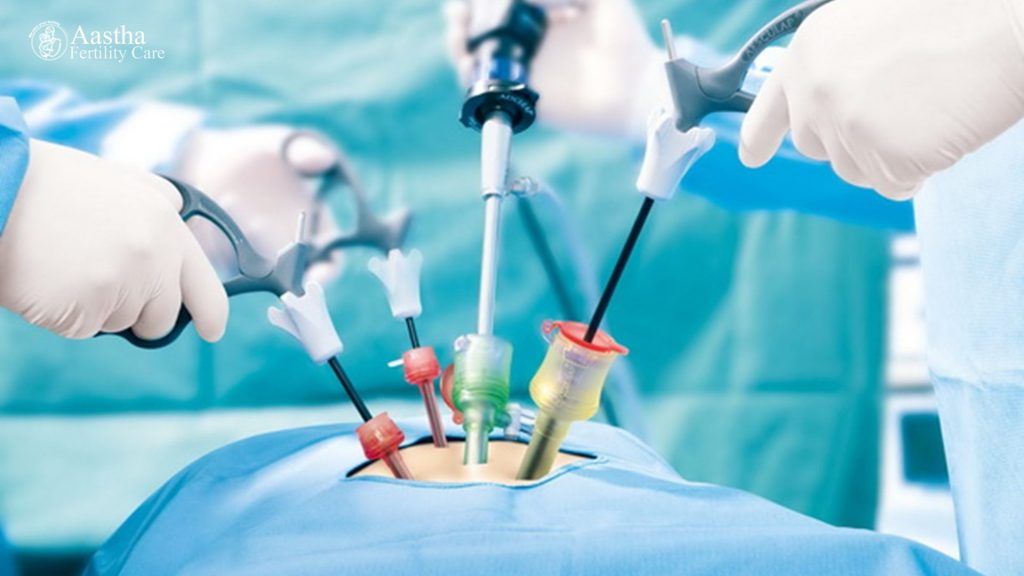
Most cases are related to infertility, and to cure that, often laparoscopic surgery is recommended.
Laparoscopy is used to determine if you have infertility or to detect any abnormalities in the structure or operation of the female reproductive system. It is a surgical procedure that allows doctors to understand the structures of your reproductive system, such as your ovaries and uterus, and the status of your fallopian tubes, whether blocked or open.
In this treatment, the doctor makes 1-3 cuts in the abdomen and inserts a laparoscopy (a thin, fibre optic tube fitted with a small light and a camera) to examine your reproductive organs and determine the cause of infertility.
Congested fallopian tubes, more often than not, cause infertility. Laparoscopy, a minimally invasive surgery, uses a laparoscope (a pencil-sized tube passed through the inflated abdomen).
When Is Laparoscopy Surgery Recommended?

Laparoscopy helps doctors in diagnosing all the conditions that affect fertility, like
- Blocked Fallopian Tubes.
- Scar tissues.
- Growth of fibroids.
- Endometriosis.
- Any other abnormalities in the reproductive system.
Usually, it is performed after all other infertility tests and treatments have been done, and a woman is still unable to conceive.
Here are some possible reasons why a doctor might advise Laparoscopy surgery –
- You are suspicious of experiencing an ectopic pregnancy
- Mischievous pain during intercourse is a red flag
- You deal with irregular and heavy periods with menstrual Cramps or pelvic pain
- When Pelvic Inflammatory diseases (PID) or Pelvic Adhesions are suspected
- When Endometriosis is supposed
- Hydrosalpinx can be the bad boy as well! Here, the end section of a fallopian tube gets blocked and fills with fluid in this location
- A fibroid has distorted the uterine cavity and blocked the fallopian tubes.
The Main Benefits of Laparoscopy Surgery
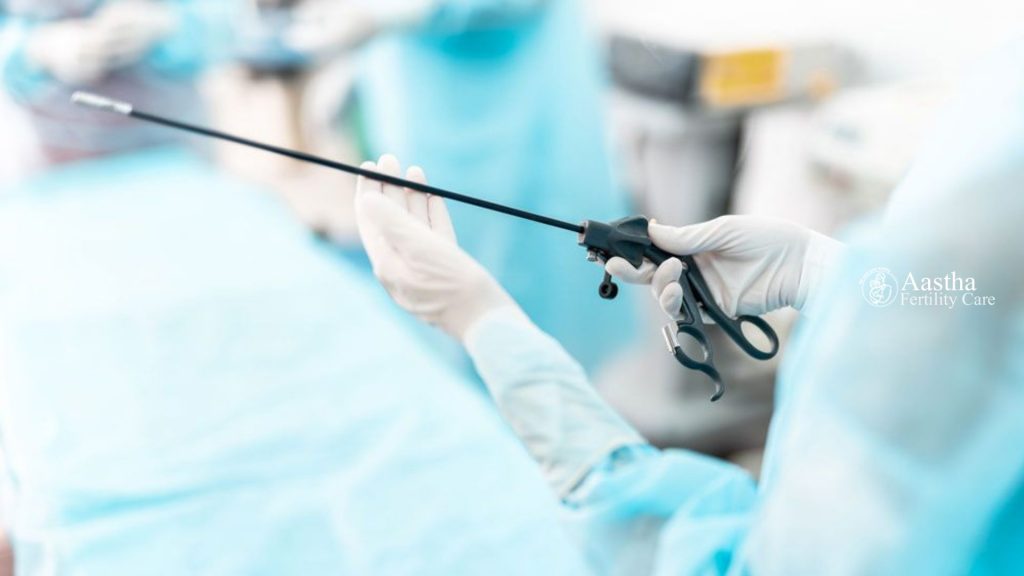
The most apparent result of a successful laparoscopy is a higher chance of conceiving. Because the surgeons can see the affected tissues, organs, and surrounding area, the procedure has a higher success rate than other oral treatments. In addition, compared to traditional open surgeries, this minimally invasive surgery causes less surgical trauma to the woman’s body.
Some benefits of performing laparoscopy:
- Freedom from excessive blood loss during or after the menstruation cycle
- Reduced anesthesia dosage
- Negligible possibility of tissue trauma thanks to the world-class quality surgical equipment used at Aastha Fertility Center
- Reduced risk of infection following surgery
- Compared to other surgeries, there are fewer pains and wounds to deal with post-operation
- Quicker recovery
- Reduced risks of bone loss. The patient does not have to deal with muscle atrophy and urine retention
Some cases of infertility can only be diagnosed through laparoscopic surgery because it allows doctors to perform a biopsy into the reproductive organs of the females and, if successful, increases the chances of conceiving naturally.
Conclusion
If you cannot conceive naturally, a blocked fallopian tube may be the cause. In such cases, medical assistance like laparoscopy or other surgery is recommended, depending on the patient’s situation.
Otherwise, blocked fallopian tubes can result in irreversible fertility; if not treated, you will be unable to conceive for the rest of your life. Book your appointment at Aastha Fertility Center to increase the chances of a successful pregnancy. Our experts will not only assist you with technical and medical skills but also understand your physical need and offer emotional support. Check out Our Services to get a complete overview of infertility treatments.

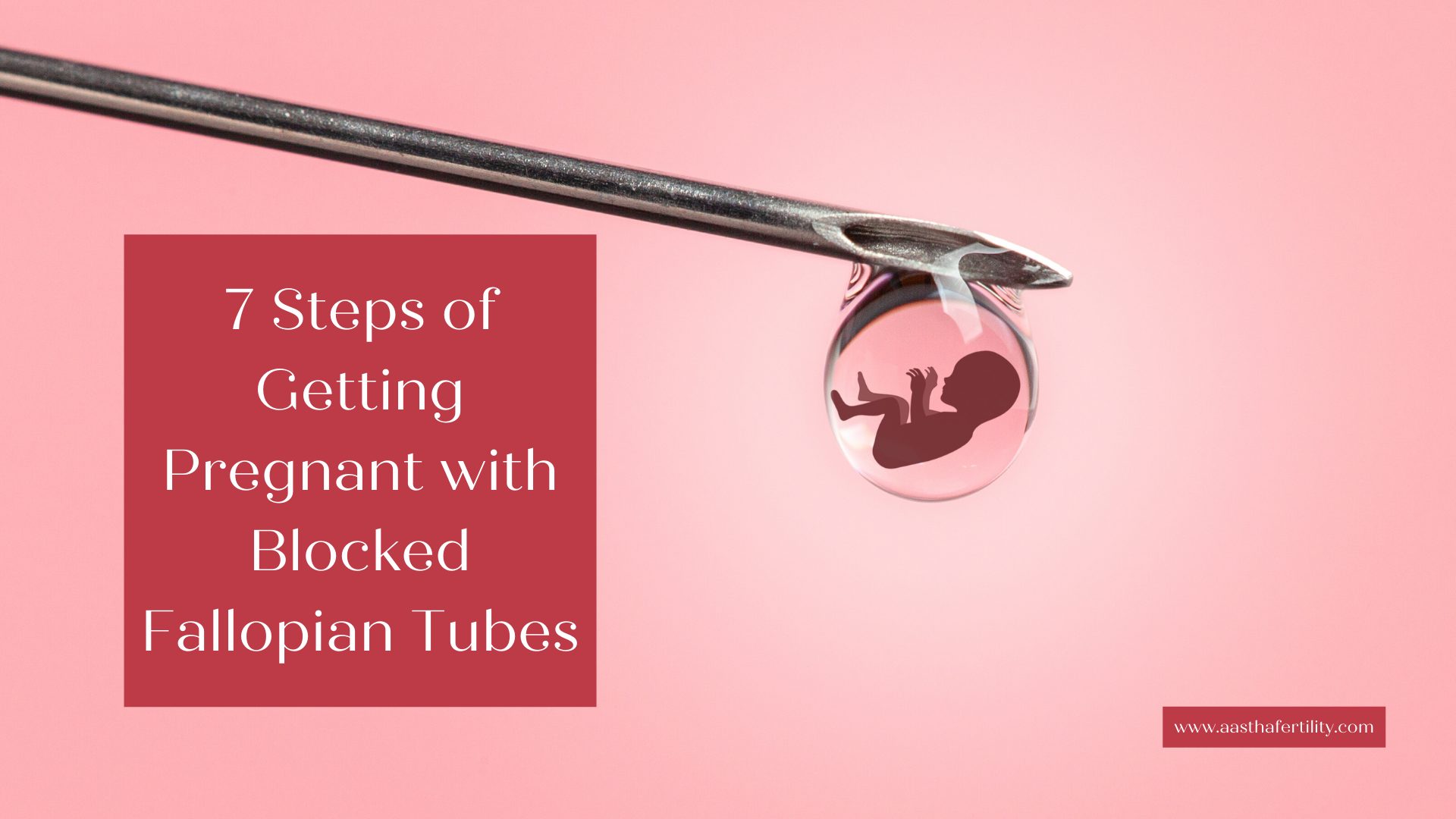

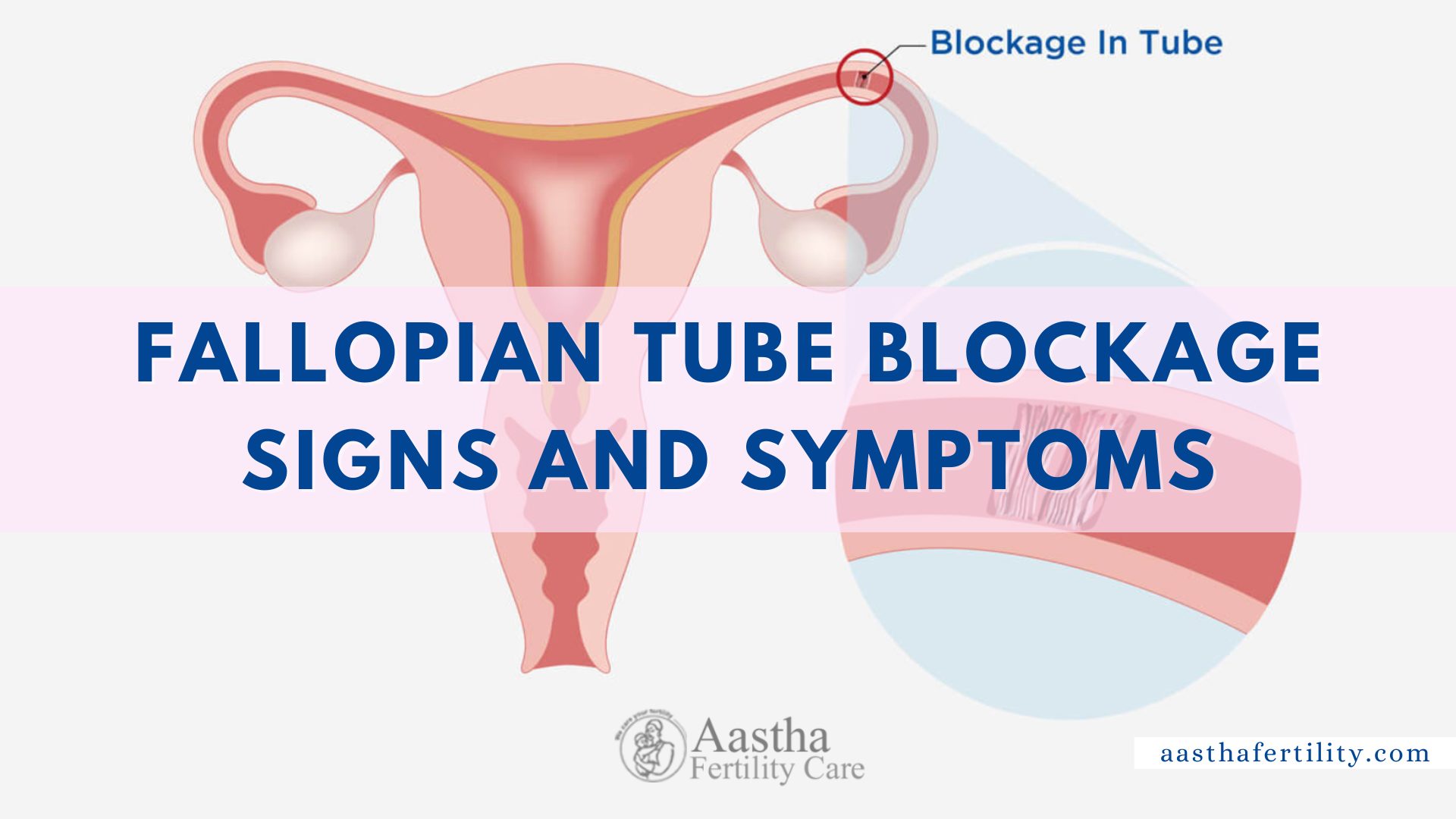

Leave a comment